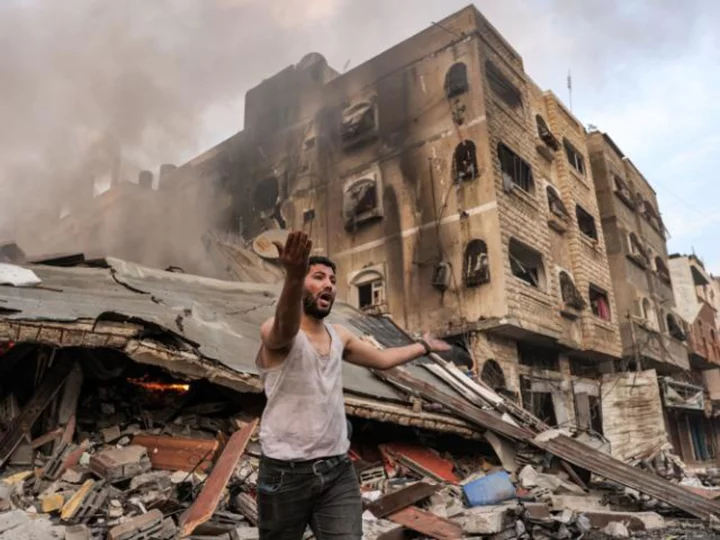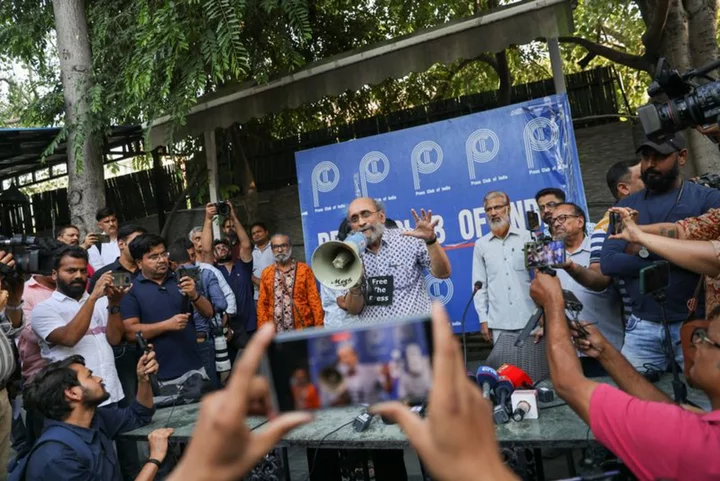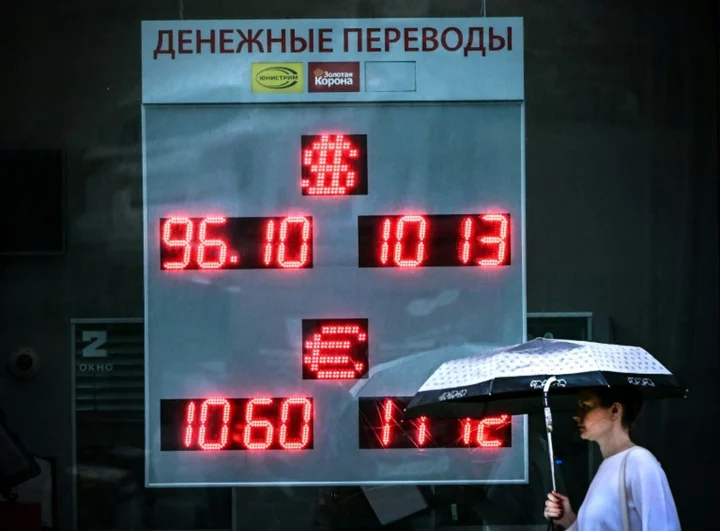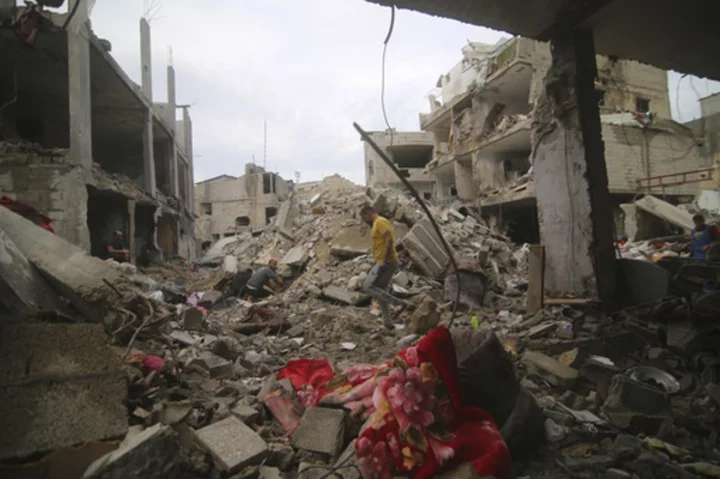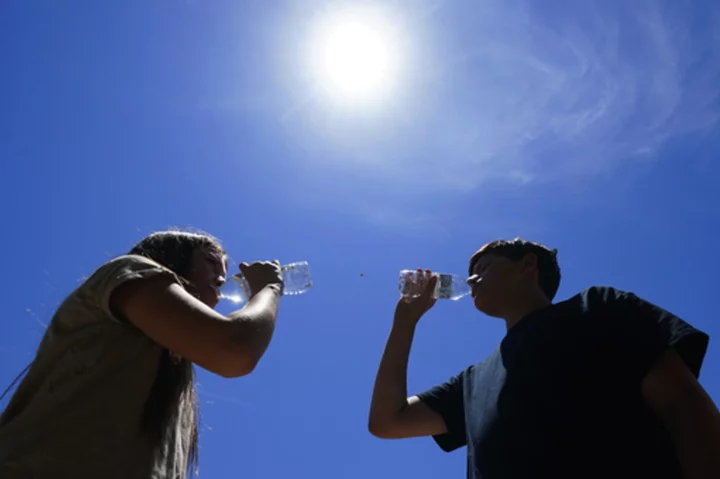Israel's military has warned 1.1 million people living in northern Gaza to evacuate their homes, amid signs Israel is set to ramp up its retaliatory offensive against Hamas following the group's October 7 terror attacks.
"Civilians of Gaza City, evacuate south for your own safety and the safety of your families and distance yourself from Hamas terrorists who are using you as human shields," the Israel Defense Forces (IDF) said.
"In the following days, the IDF will continue to operate significantly in Gaza City and make extensive efforts to avoid harming civilians."
The UN on Thursday said it was informed by their liaison officers in the Israeli military that "the entire population of Gaza north of Wadi Gaza should relocate to southern Gaza within the next 24 hours."
The UN has decried such an order, saying it is impossible for civilians to evacuate.
"The United Nations considers it impossible for such a movement to take place without devastating humanitarian consequences," according to a statement from Stephane Dujarric, the spokesperson for the UN Secretary General.
Dujarric said the UN "strongly appeals for any such order, if confirmed, to be rescinded avoiding what could transform what is already a tragedy into a calamitous situation."
The order applies to all UN staff and those sheltered in UN facilities -- including schools, health centers and clinics, according to the statement.
Gaza is one of the world's most densely populated pieces of land with more than 2 million people crammed into 140 square miles, its borders blockaded for years by Israel and Egypt. Gaza City is part of the coastal strip and is particularly crowded.
It is unclear if or when Israel plans to launch a potential ground incursion into Gaza but for days Israel has been massing hundreds of thousands of troops, reservists and military equipment at the border while it ramps up its siege and aerial bombardment of the enclave.
Calls are growing for the opening of a humanitarian corridor in Gaza so civilians can access basic supplies such as water, food, fuel and medicine amid warnings from UN experts that residents are at risk of starvation.
Atrocities committed by Hamas in Israel last weekend sparked international revulsion and escalated the decades-old conflict between Israelis and Palestinians.
Hamas militants breached the heavily-fortified border in a coordinated assault, indiscriminately killing men, women and children, and taking as many as 150 hostages back to Gaza. More than 1,300 people were killed in Israel and thousands more injured.
Israel's response has been swift and relentless.
For six days, Israeli warplanes have pounded Gaza with airstrikes that have reduced streets and homes to rubble and killed over 1,500 people, including 500 children, and injured 6,000 others, according to the Palestinian Health Ministry.
Time running out for Gazans
The Israeli siege has stopped essential supplies of electricity, food, water and fuel from entering Gaza and medical and relief workers have warned that time is running out to prevent a humanitarian catastrophe for the 2 million trapped civilians.
More than 432,000 Palestinians have been displaced by the conflict and airstrikes have hit at least 88 education facilities, according to the UN Relief and Works Agency.
Health systems in Gaza are at breaking point, and generators used for critical functions will cease working in a few days when the fuel runs out, with devastating consequences for patients "who need lifesaving surgery, patients in intensive care units, and newborns depending on care in incubators," the World Health Organization said.
Doctors Without Borders (MSF) international president Christos Christou said millions of civilians in Gaza are facing "collective punishment" and that safe spaces must be established.
Relief groups are unable to bring aid into the sealed-off enclave and are calling for an urgent emergency corridor to be established for the transfer of humanitarian supplies.
The United Nations has warned that targeting innocent civilians and withholding of essential supplies is prohibited under international law.
Norwegian Minister of Foreign Affairs Anniken Huitfeldt said preventing access to humanitarian support for Gaza "is unacceptable" and Israel "has an obligation to allow for the entry of humanitarian aid."
The Biden administration said Thursday it is "working very diligently" with Israel and Egypt on safe passage out of Gaza for civilians ahead of a possible ground incursion, according to White House National Security Council spokesperson John Kirby.
Israel has stood firm in its response.
Israel Defense Force (IDF) spokesperson Lieutenant Colonel Jonathan Conricus told CNN that, "We are at war with Hamas and we will not allow anything into the Gaza strip that supports the fighting ability of Hamas. If it comes to the price of inconvenience for the population, so be it."
On Thursday, Israel's energy minister Israel Katz said supplies to Gaza will remain cut off until all hostages captured by Hamas are freed.
"No electrical switch will be turned on, no water hydrant will be opened, and no fuel truck will enter until the Israeli abductees are returned home. Humanitarian for humanitarian. And no one will preach us morals," Katz said on social media.
Hamas militants are holding as many as 150 people hostage in locations across Gaza and earlier this week warned it would start killing hostages if Israel continued its bombardment of Gaza.
Israel on a war footing
Evidence of that war footing could be seen just outside the blockaded enclave, where a massive mobilization of Israeli troops, armored vehicles, trucks of ammunition, and other military equipment are being prepared for the next phase of Israel's response to Hamas's terrorist attacks.
Past Israeli ground offensives in 2008 and 2014 have resulted in high casualties of Israeli soldiers and one major difference this time is that Hamas fighters have captured such a large number of hostages.
Saturday's bloody attack also displayed a level of military capability and barbarity by Hamas beyond what they have previously displayed.
CNN analysis of videos released by Hamas and its affiliates reveals that militants trained for the onslaught for months and across at least six sites in Gaza.
Footage from 2022 shows Hamas fighters flooding a training area, shooting rockets and capturing pretend prisoners as they surround mock Israeli buildings. Another video taken more than a year ago, shows Hamas fighters practicing take-offs, landings and assaults with paragliders -- the same unusual assault mode that Hamas deployed with lethal effect in the same October 7 attack.
Fresh evidence of Hamas's brutality
More evidence has emerged of the attack's brutality with the release of photos showing murdered babies.
The Israeli Prime Minister's office released three photos showing two babies whose bodies had been burned beyond recognition and a third bloodstained infant's body.
US Secretary of State Antony Blinken, who was shown the images on his visit to Jerusalem Thursday, said it "almost defies comprehension."
"A baby, an infant riddled with bullets. Soldiers beheaded. Young people burned alive in their cars, or their hideaway rooms," said Blinken at a press conference in Israel. "It's beyond what anyone would ever want to imagine, much less actually see and, god forbid, experience."
Hamas on Thursday "firmly" denied its involvement in killing and beheading babies, saying the allegations were "unethically and unprofessionally" adopted by media outlets.
Basim Naim, an official with Hamas information office, said in a video statement "there were clear instructions from the top commanders of Al Qassam Brigades to avoid targeting civilians or killing them."
Those claims fall flat in the face of testimonies from multiple survivors and eyewitnesses who have detailed the scale and nature of atrocities committed by Hamas as well as the staggering number of dead and captured.
In Kfar Aza, a kibbutz in southern Israel, the IDF told CNN that militants carried out a "massacre" in which women, children, toddlers, and elderly were "brutally butchered in an ISIS way of action."
In Be'eri, Hamas militants stormed the kibbutz, murdered more than 120 of its residents, including children, and kidnapped others.

